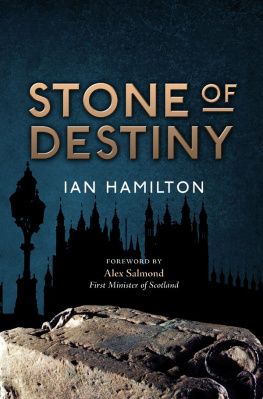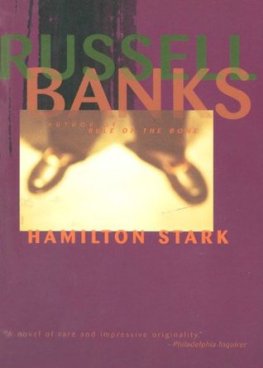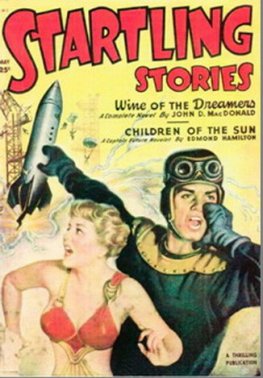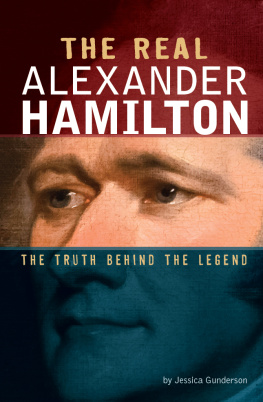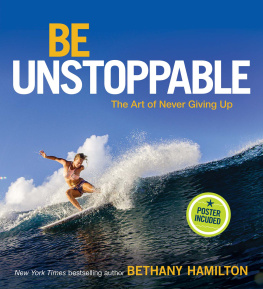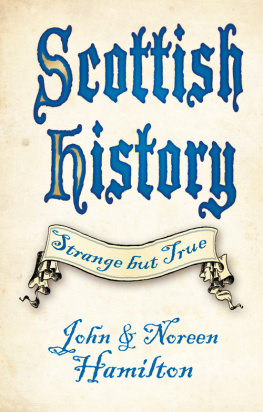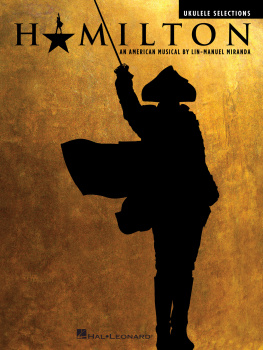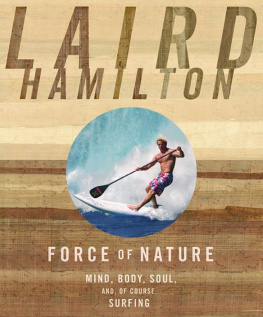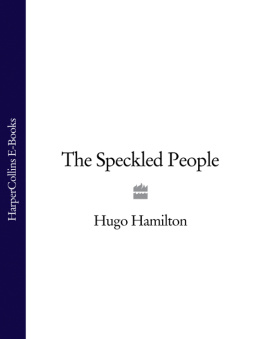Stone of Destiny

Stone of Destiny

Ian Hamilton

This eBook edition published in 2011 by
Birlinn Limited
West Newington House
Newington Road
Edinburgh
EH9 1QS
www.birlinn.co.uk
First published as No Stone Unturned in 1952 by Gollancz, London Subsequently published as The Taking of the Stone of Destiny in 1991 by Lochar Publishing, Moffat
First published by Birlinn Ltd in 2008
Copyright Ian Hamilton 1991, 2008 Foreword copyright Alex Salmond 2008
The moral right of Ian Hamilton to be identified as the author of this work has been asserted by him in accordance with the Copyright, Designs and Patents Act 1988
All rights reserved. No part of this publication may be reproduced, stored or transmitted in any form without the express written permission of the publisher.
eBook ISBN: 978-0-85790-066-1
British Library Cataloguing-in-Publication Data A catalogue record for this book is available from the British Library
To Jeannette:
The safe harbour of all my joys
Foreword

I was not even born when Ian Hamilton reclaimed the Stone of Destiny, but I feel I know the story as if it were my own.
The reason for that familiarity is that anyone who had any pride in being Scottish knew of Ian, his colleagues and their exploits and saw the events of Christmas Eve 1950 as the first stirrings of something big. In that sense there is a direct line between what Ian did then, and what the Scottish National Party achieved in May 2007, when we entered this nations government for the first time. It was Ian who by means of a single act started the modern process of waking this country up to its history and its potential.
Of course Ian was not alone. The four students who stealthily waited in the chilly dark of Westminster Abbey deserve collective remembrance and collective praise. Ian, along with Alan Stewart, Gavin Vernon and Kay Matheson, took a risk with their futures in an age which was much less tolerant than ours. And in returning the Stone to Scotland they demonstrated that there was a new generation in our country which was prepared to take individual risks in order to assert our national rights.
Ian, of course, has gone on doing that in his inimitable style ever since. The toughness of mind and character he showed more than half a century ago as a student has been his constant hallmark as a tireless exponent of Scottish independence and as a successful advocate. He has fought for countless individuals in the courts, often against overwhelming odds, whilst always standing up for his country when few others were prepared to do so. He is both an original thinker and an iconoclast, and it is typical of him that in retirement he has fearlessly embraced a new challenge and some new technologies in order to become one of Scotlands most read internet bloggers. Ian always wanted to be and is at the cutting edge!
This book and the film which it has now inspired will bring to a new audience the events of that long ago winter when Scotland cheered the cheek of a daring raid whilst the establishment huffed and puffed. It is a good and massively entertaining story in itself, but it also has a wider resonance. The fact that the Stone (or at least a stone!) now resides in Scotland in Edinburgh Castle, no less testifies to the abiding interest that Ian and his friends created, not just in the ultimate fate of that block of sandstone but in the whole question of the proper relationship between the countries of this island.
The final return of the stone by a Tory Government in 1996 was meant to placate Scottish feeling. Devolution four years later had the same intention. But Scots are more perceptive than that. Scotland will only fully flourish when it secures independence equality between the countries and peoples north and south of the border. That is what I have spent my life working for, just as Ian has spent his on the same pursuit. It has been an honour to work with him on that task, which I think we both know is nearer than ever to completion.
Rt Hon. Alex Salmond MSP MP
First Minister of Scotland
Fold of value in the world west from Greece
Over whom it has been our duty to keep guard
Have we slept on our watch?
Hugh MacDiarmid
Lament for the Great Music
Chapter One

I am a Queens Counsel in a state of treason against Westminster. Yet for many years I was ashamed of this book. Never of our action; only of the book. It was first published when I was a stripling of 25 and knew how to put the world to rights. Striplings should not write books, or so I thought. They put things on record which cling to the author in after years. I long hung my head in shame at the brashness of the youth who wrote these pages. Worse, when I was doing other interesting things I disliked being referred to as The Stone Man. For nearly 40 years I refused to read what I had written here.
Now I know I was wrong. Not wrong in what I wrote, but wrong to be ashamed of it. This is a youngsters book, and I was immeasurably lucky to be that youngster. I am now a member of the establishment, not of that old, worn-out, Anglicised establishment of second-raters, but of the new one, which proudly affirms the ancient doctrine of our law that the power of government resides with the Scottish people, and not at Westminster. I look back on my visit to that other Westminster without dismay or shame, but with a great elation. I done it. Me and some others. That girl and those boys done well. I was one of them. It was a great adventure.
I have had many other adventures since. Yet this was the first and most important one. It set the tone for my whole life. It taught me that non-conformity in thought and deed is the only vital life. The individual is more important than the mass. Any single person can change history. MPs are the least effectual of citizens. Political parties are for sheep-minds. Heresy is godliness. And so on. It was the first major event in a life in which I have loved greatly, and in which I have been both loved and hated in return. I would never have it otherwise. To inspire only respect is to fail. Respect is a form of indifference.
I have therefore not changed much in a book which was first published in 1952. I have added two chapters at the end to bring the story up to date, and done some revision for the sake of clarity, but the story itself remains the same. The extravagances of youth are all there. I hereby homologate and accept them. Every single word and extravagance.
Yet in accepting them I have one qualification to make. As a youngster I was far too moderate. Away with English government, in every aspect. That is now my view. English government is for the English, and I am a Scot. Not a Scottish Nationalist. I do not need any such desperate description to define my love for my country. Indeed, I think that nationalism can be dangerously akin to racism, and to be a racist is to defy the common humanity of all mankind. I am a simple Scot, and I want my country to take its place in Europe and in the world. We Scots are European, not English, not British. In the muddled way of youth I set out to make these views public not by speech or writing, but by action.
Next page
